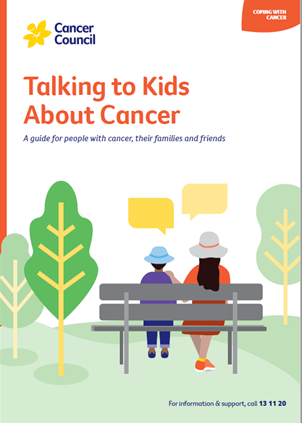- Home
- About Cancer
- Family and friends
- Talking to kids about cancer
- Living with advanced cancer
Living with advanced cancer
This section helps you talk to your children about a loved one’s cancer returning or spreading. These are emotional and personal topics, so some parts may be hard to read. For more support, reach out to hospital staff or these listed services.
Learn more about:
- Feeling overwhelmed
- What do children need to know?
- How children react
- What words should I use?
- Answering key questions about advanced cancer
- How children understand death
- Maintaining family life

Feeling overwhelmed
Coping with advanced cancer in the family can feel overwhelming. To support your children, it’s important to have support for yourself too. These suggestions may help.
- Ask family and friends for help. Let them know what you need – they will probably be relieved that you can give them something to do.
- Get practical assistance and information from Cancer Council and other organisations to help ease your worries.
- Talk with your GP and consider getting a referral to a psychologist or psychiatrist, or speak with a counsellor. Depression and anxiety are common and they affect how you cope. Effective treatments are available.
- Consider using complementary therapies, such as massage, to manage stress. You could also try the relaxation and meditation exercises in our Finding Calm During Cancer podcast.
- Use programs developed by Canteen, Camp Quality or Redkite. Lifeline and Kids Helpline both provide 24-hour phone counselling.
→ READ MORE: What do children need to know?
Podcast: Explaining Cancer to Kids
Listen to more episodes from our podcast for people affected by cancer
More resources
Prof Jane Turner AM, International Psycho-Oncology Society President Emeritus,The University of Queensland, QLD; Taylor Baker, Consumer; Dr Ben Britton, Principal Clinical and Health Psychologist, Head of Psychology, Hunter New England Mental Health, NSW; Camp Quality; Dr Lisa Cuddeford, Head of Department, WA Paediatric Palliative Care Service, Perth Children’s Hospital, WA; A/Prof Peter Downie, Head, Paediatric Haematology–Oncology and Director, Children’s Cancer Centre, Monash Children’s Hospital, VIC; Dr Sarah Ellis, Clinical Psychologist, Kids Cancer Centre, Sydney Children’s Hospital, NSW; Malia Emberson-Lafoa’i, Consumer; Kate Fernandez, 13 11 20 Consultant, Cancer Council SA; Jane Gillard, Consumer; Mary McGowan OAM, International Childhood Cancer Advocate, VIC; Annette Polizois, Senior Social Worker, Women, Family and Emergency Care Team, Royal North Shore Hospital, NSW; Rhondda Rytmeister, Clinical Psychologist, HeadWayHealth (formerly Snr Clinical Psychologist, The Cancer Centre for Children, Westmead, NSW); Nadine Street, Head of Social Work and Social Welfare, HNE Mental Health Service, NSW; Warren Summers, Online Counsellor, Canteen, NSW.
We would also like to thank the health professionals, consumers, organisations and editorial teams who have worked on previous editions of this title, and we are grateful to the parents and young people whose real-life stories have added to the richness and relevance of this book.
We thank and acknowledge Dr Paula K. Rauch, MD, Founder and Director, Marjorie E. Korff PACT (Parenting At a Challenging Time) Program and Associate Professor of Psychiatry, Harvard Medical School, whose research and writing on helping parents talk to their children about cancer was used as source material for this book and has been adapted in several sections: pages 8–11, How children understand cancer; page 22, Answering key questions: Are you going to die?; page 26, Involving the school or preschool; pages 30–31, Hospital visits; and pages 36–37, Encouraging family time. We also thank the American Cancer Society for permission to use and adapt material on pages 8-11 from its book Cancer in Our Family: Helping children cope with a parent’s illness (2013); Macmillan Cancer Support for permission to use its book Talking to Children and Teenagers When an Adult Has Cancer (2013) as a source of information; Jessica Watt, Oncology Social Worker, The Children’s Hospital at Westmead, for her contribution on page 20, When another child has cancer; and Diane McGeachy, Hobart Counselling Centre, for contributing material for page 37, Spending one-on-one time.
View the Cancer Council NSW editorial policy.
View all publications or call 13 11 20 for free printed copies.

